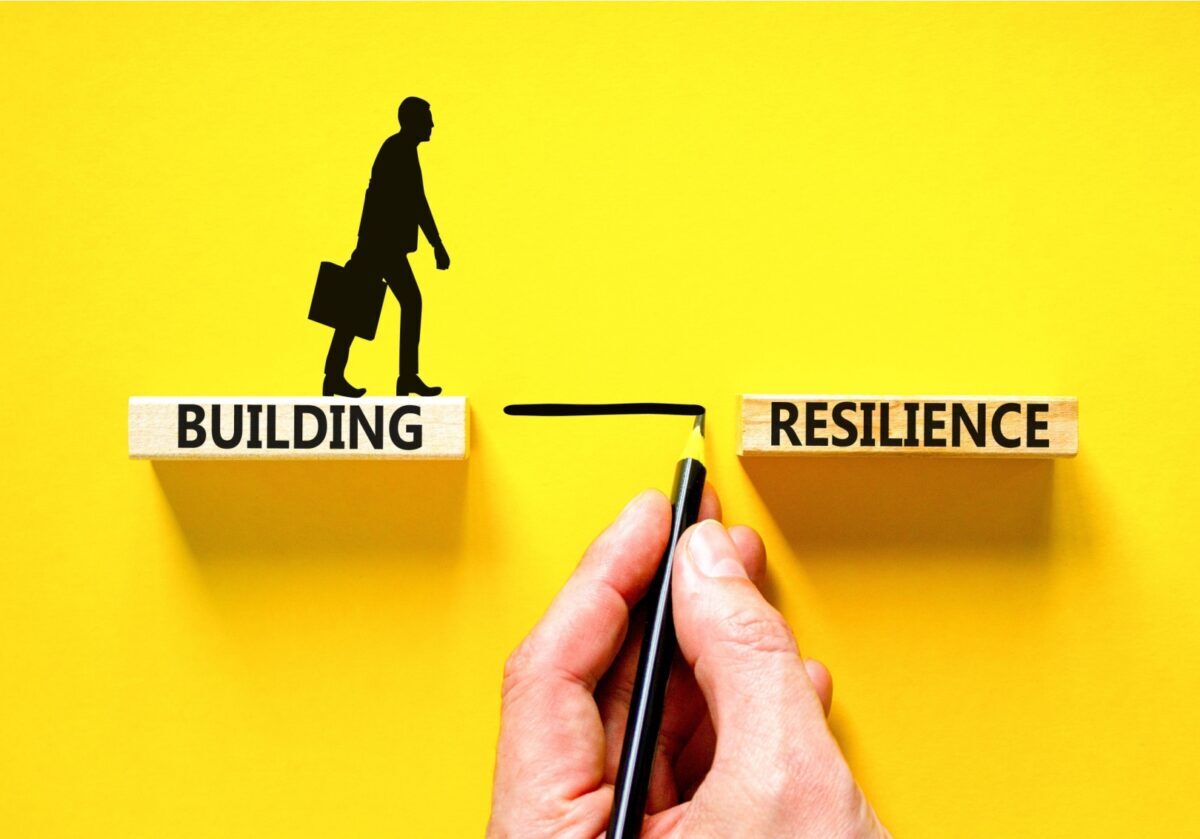Life is rarely perfectly smooth and predictable all the time. Unexpected change, uncertainty, and growth can feel overwhelming — sometimes impossible.
However, intense pressure can create beautiful outcomes like transforming carbon atoms into diamonds. Just as carbon deposits become diamonds under the right conditions, you, too, can turn adversity into strength with the right mindset and support from a coach. A coach can help you build resiliency so you can adapt to challenges and emerge stronger than before.
Understanding Resilience
Building resiliency helps you navigate life’s challenges with confidence, allowing you to adapt, recover, and thrive in the face of adversity.
What Is Resilience?
Resilience is often defined as the ability to adapt to and recover from challenges, stress, or adversity. It’s a skill that encompasses emotional, mental, and behavioral aspects, enabling a person to bounce back from the highs and lows of life and keep moving forward. While some people are born with higher resiliency levels, it is a skill that can be strengthened and developed through coaching.
The Importance of Resilience
Having the ability to be flexible and adaptable is key to personal well-being and professional success. When you develop strategies for managing stressors and overcoming self-doubt, you can feel more confident in your professional role and more capable of experiencing emotional stability, even in the most challenging situations.
When you’re able to do that, you’ll have a greater ability to cope with hardships. You’ll notice that you have stronger personal relationships and are able to nurture professional relationships to encourage teamwork.
When you’re resilient and encourage the same in the teams you lead, you’ll create psychological safety where others feel safe to take risks, voice ideas, and learn from mistakes. Those attributes lead to sustained performance and greater innovation.
Common Barriers to Resilience
Resiliency and adaptability are critical to overcoming challenges. It takes effort to develop these skills and to break through the common barriers to resiliency. These barriers frequently include:
- Negative self-talk.
- Lack of growth strategies.
- Overwhelm and burnout.
- Feeling that you have to “tough it out alone.”
- Believing that a smile is the only reaction to setbacks.
The Role of Coaching in Building Resilience
Working with a coach is key to becoming more flexible and adaptable. Coaches provide guidance, support, and resources to help you address difficulties effectively and confidently.
Providing a Safe Space
When you sign a coaching agreement, the coach promises confidentiality. Coaches bound by the ICF Code of Ethics do not reveal conversations from a coaching environment unless you ask or give permission. Beyond ensuring your discussions remain private, coaches provide a judgment-free zone. They create a supportive environment that gives you the space to share your genuine thoughts and emotions.
Encouraging Self-Reflection
Self-reflection is a powerful tool for increasing resiliency. It begins with understanding how you intuitively respond to challenges. A skilled coach asks questions that help you become more self-aware of your emotions and actions in high-pressure situations. Knowing this opens the door to consciously choosing more productive reactions in the future.
Through self-reflection, a coach encourages clients to explore strengths and areas for growth. This may include thinking about past situations and outcomes to understand better what worked, what didn’t and strategies to use in future scenarios.
Developing a Resilience Toolkit
Building resilience requires practical strategies. A coach offers a variety of tools to equip you with the essential skills, habits, and mindset shifts to thrive in any situation.
These are a few mindfulness practices a coach may suggest for your toolkit:
Breathing Exercises
What it looks like: Closing your eyes and inhaling deeply for a count of four. Hold your breath for four counts and exhale for another four. Repeat this several times. This technique is known as box breathing and can help improve focus, reduce stress, and calm the nervous system.
Practicing Gratitude
What it looks like: Set aside five minutes at the start or end of each day to list what you’re grateful for. Beginning with gratitude can set a positive tone for the day ahead, while ending with it encourages reflection and perspective.
Conducting a Body Scan
What it looks like: Sit in a position that is comfortable with your feet flat on the floor and pay attention to where you feel tension, pain, or anything unusual in your body to assess how you’re feeling. Then visualize releasing any tension you might be holding onto.
Cultivating emotional intelligence and self-regulation skills are also important components of a resilience toolkit. Coaches may encourage you to:
- Take an emotional intelligence (EQ) assessment to gain insight into your current abilities and identify opportunities for growth.
- Ask others to complete a 360-degree feedback survey to gain insights into how others perceive your EQ.
- Journal for self-reflection focused on identifying emotional response triggers and patterns.
- Name emotions to reduce their intensity and regulate around them.
Fostering a Growth Mindset
It’s only natural to feel frustrated or discouraged by setbacks. A coach will give you space to acknowledge these feelings and then encourage you to adopt a growth mindset. Psychologist Carol Dweck pioneered the growth mindset, which is a belief that abilities, skills, and intelligence can be developed through effort and persistence. This contrasts with the fixed mindset, where individuals believe things are innate and unchangeable.
A coach may use several tactics to guide you to discover proactive approaches to your challenge, allowing for a sense of optimism rather than doom. You may be asked to:
- Reframe your perspective from thinking something is “too hard” to asking, “What can I learn from this?”
- Use “yet” as in, “I haven’t accomplished xx yet, but can by doing yy.”
- Identify what you have control over and what you need to let go of.
- Focus on solutions. For example, “This one step will get me closer to xx.”
- Look for resources by considering who or what support you need to further your growth mindset.
Providing Accountability
Change can be hard when you go it alone. A coach serves as an accountability partner to help you stay motivated and committed to your goals. They will work with you to define how to measure progress and remind you to celebrate small wins.
How Coaching Empowers You to Handle Setbacks Effectively
Through coaching, you can learn strategies and tools and develop a mindset that enables you to navigate obstacles more effectively. Here’s a look at how coaches work with clients to turn obstacles into opportunities.
Identifying and Addressing Negative Patterns
- Uncover limiting beliefs and self-sabotaging behaviors.
- Replace them with empowering thoughts and actions.
To overcome negative self-talk and reactions, a coach might ask you to recall a recent situation where you felt frustrated or disappointed.
Respond with the first thoughts that come to mind — don’t filter yourself. Chances are, it might sound like, “I’m not good enough” or “I’ll never be able to do x.”
A coach will encourage you to reframe by answering questions such as:
- What was the lesson in this experience?
- What talents or strengths helped me through x?
- How might this experience prepare me for future situations?
- What advice would I offer someone else in the same position?
Setting Realistic and Meaningful Goals
Big goals can feel overwhelming. A coach will ask you to name the big challenges or achievements and then have you break those down into manageable steps.
A coach may ask:
- What is the first small step you can take toward x?
- What roadblocks do you anticipate?
- How can you prepare for obstacles?
- What do you need to do (today, this week, or this month) to move forward?
- How can you align your efforts with your values and purpose?
Strengthening Decision-Making Skills
As a result of working with a coach, you’ll notice that you have stronger decision-making skills because you will learn how to analyze options in tough situations, building confidence in making choices under pressure.
Promoting Adaptive Strategies
Life will always be full of challenges, both personally and professionally. Finding effective strategies is the key to avoiding letting obstacles drag you down. Coaches can introduce you to techniques you may not have tried before, such as journaling, meditation, time management, developing a support network, and knowing when to seek help.
Practical Steps to Enhance Resilience Through Coaching
Resilience is an essential skill on both an individual and organizational level.
For Individuals:
Before you can nurture resilience in others, you must strengthen your skills. Here are a few ways to recognize a coach might be beneficial in helping you move forward.
- You struggle to rebound after challenges.
- You feel overwhelmed by stress.
- You feel stuck in an unproductive cycle.
- You notice self-doubt clouding your decision-making.
Remember, for coaching to be effective, be open to exploring new perspectives and strategies.
For Organizations:
Resilient teams remain engaged, productive, and innovative despite setbacks. As a result, they tend to experience higher morale, improved collaboration, and stronger problem-solving capabilities. Leaders at any level within an organization can foster resilience in their teams by:
- Modeling resiliency skills.
- Integrating resilience-focused coaching into leadership development programs.
- Promoting a culture that values adaptability and growth.
Final Thoughts
Embracing challenges as opportunities for growth allows you to thrive through adversity. Just like intense pressure and heat turns carbon atoms into diamonds, setbacks create the conditions you need to emerge stronger. A coach can provide you with the strategies and mindset shifts necessary to do so.
Explore coaching services to strengthen your resilience and thrive in the face of adversity. Use the Credentialed Coach Finder to find a coach.
Disclaimer
The views and opinions expressed in guest posts featured on this blog are those of the author and do not necessarily reflect the opinions and views of the International Coach Federation (ICF). The publication of a guest post on the ICF Blog does not equate to an ICF endorsement or guarantee of the products or services provided by the author.
Additionally, for the purpose of full disclosure and as a disclaimer of liability, this content was possibly generated using the assistance of an AI program. Its contents, either in whole or in part, have been reviewed and revised by a human. Nevertheless, the reader/user is responsible for verifying the information presented and should not rely upon this article or post as providing any specific professional advice or counsel. Its contents are provided “as is,” and ICF makes no representations or warranties as to its accuracy or completeness and to the fullest extent permitted by applicable law specifically disclaims any and all liability for any damages or injuries resulting from use of or reliance thereupon.
Authors
Post Type
Blog
Audience Type
Individuals Interested in Experiencing Coaching
Topic
Experience Coaching
Related Posts
Why Coaching Works: The Psychological Nutrients That Feed Flourishing
Where I’m from, many people still view coaching as woo-woo. Someone once…
Why You Feel Stuck and How Coaching Helps
It doesn’t always begin with a dramatic event. Sometimes, it arrives quietly.…
What to Expect and How to Prepare for a Coaching Session
Have you ever felt like your mind is full of distracting noise…







